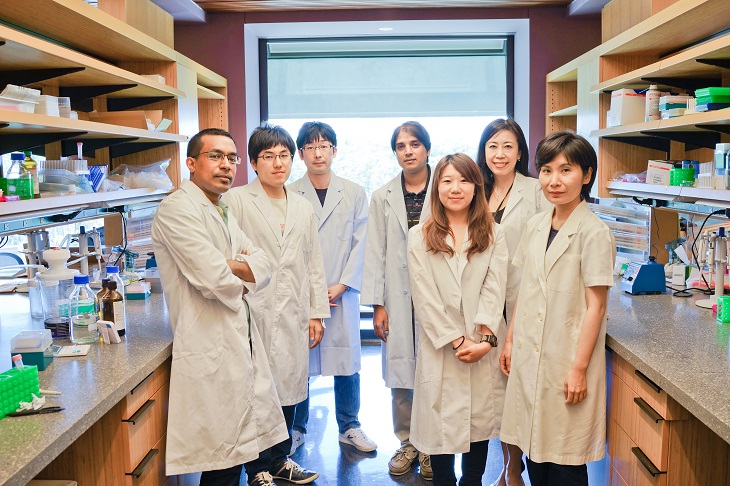FY2013 Annual Report
Immune Signal Unit
Assistant Professor Hiroki Ishikawa

Abstract
Immune signal unit studies immune mechanisms causing diseases. Immune system has developed to defend our body against invading pathogens, although dysregulation of the system can cause diverse diseases including allergy and autoimmune diseases. An important event in immune responses is generation of helper T cells. Upon recognition of a specific antigen, naïve CD4 T cells differentiate into several effector helper T subsets which lead to different outcomes of immune responses. T helper 17 (Th17) subset plays a central role in many of autoimmune diseases. Cytokines TGF-b and IL-6 are required for the priming of Th17 differentiation. However, another cytokine IL-23 is essential for generation of disease-causing Th17 cells. We are focusing on the mechanism of IL-23-dependent pathogenic Th17 generation. In FY2013, we continued to characterize new genes and pathways which might be involved in generation of pathogenic Th17 cells.
1. Staff
- Hiroki Ishikawa, Assistant Professor
- Hayato Yamada, Postdoctoral Scholar
- Zafrul Hasan, Postdoctoral Scholar
- Bijay Parajuri, Postdoctoral Scholar
- Saori Nishijima, Technician
- Shiho Okitsu, Technician
- Rika Yoshizawa, Research Administrator
2. Collaborations
- Nothing to report.
3. Activities and Findings
CD4 T helper (Th) cells play a critical role in orchestrating adoptive immune responses against not only various pathogens infection but also self-antigen triggering autoimmunity. Upon recognition of a specific antigen, naïve CD4 T cells differentiate into different effector subsets. Among them, recently identified Th17 is involved in various autoimmune diseases. Cytokines TGF-b and IL-6 are required for the priming of Th17 differentiation. However, another cytokine IL-23 is essential for the full differentiation of pathogenic Th17 cells. Although the critical role of IL-23 for pathogenic Th17 differentiation has been demonstrated, the molecular mechanism of IL-23-dependent pathogenic Th17 differentiation remains unknown.
To elucidate the mechanism of IL-23-dependent pathogenic Th17 differentiation, we screened IL-23 responsive genes by microarray analyses and identified several genes whose expression was upregulated by IL-23 in the last fiscal year. In FY2013, we sought to examine signaling pathways that regulate the induction of the IL-23-responsive genes. Using knockout mice for known Th17 transcription factors, we found that many of IL-23 responsive genes are induced by STAT3-dependent and RORgt-independent uncharacterized pathway. Furthermore, we screened and identified a transcription factor which is involved in this uncharacterized signaling pathway.
To study the role of IL-23 responsive genes, we have generated a conditional knockout mouse (cKO) strain for an IL-23-responsive transcription factor. We are currently breeding the cKO mice with T cell-specific Cre-deleter strain to analyze the role of this transcription factor in Th17 differentiation and development of autoimmune diseases. We also introduced commercially available knockout mouse strains for IL-23 responsive genes. We will analyze function of these genes using the knockout mice in the next fiscal year.
4. Publications
4.1 Journals
Nothing to report.
4.2 Books and Other One-Time Publications
Nothing to report.
4.3 Oral and Poster Presentations
Ishikawa, H. Mechanism of pathogenic T helper cell differentiation. 15th Meeting of Research Group of Next Generation Medical Bioengineering, Naha, Okinawa, (2013)
5. Intellectual Property Rights and Other Specific Achievements
Nothing to report
6. Meetings and Events
Nothing to report.
7. Others)
Nothing to report.



